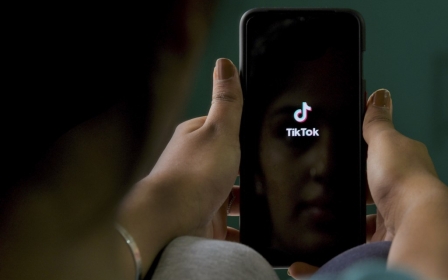Egypt: TikTok influencers sentenced to up to 10 years in prison for violating 'social values'

A Cairo criminal court on Sunday sentenced two popular TikTok influencers to lengthy prison sentences over alleged human trafficking-related charges.
Mawada al-Adham, 23, was sentenced to six years in prison, while Haneen Hossam, 20, was sentenced to 10 years, in an initial ruling that may be appealed. Each woman also received a fine of 200,000 Egyptian pounds ($12,700).
The two young women had been tried over accusations that they were “using girls in acts contrary to the principles and values of Egyptian society with the aim of gaining material benefits”.
According to local media, the prosecution accused the influencers of "exploiting" people of disadvantaged economic circumstances by promising them money, and also of belonging to a criminal group - arguing that such charges amounted to human trafficking.
The sentencing came after the pair were acquitted in January in another case related to violating family values and principle in the content posted on TikTok and other social networks.
Adham had over three million followers on TikTok, where she used the platform to share videos of herself lip-syncing and dancing. Hossam, who has a following of one million people, uploaded footage detailing how others could use the app to earn money.
Earlier this month, another TikTok influencer, Renad Emad, was sentenced to three years in prison and fined 100,000 Egyptian pounds ($6,350) over her content, which was deemed to violate societal values as well as amounting to human trafficking.
The influencers have repeatedly argued that media had taken their content out of context, and that their videos were following a number of trends on TikTok, making it no different from content that is shared on TV or other forms of entertainment.
Social media reaction
The sentences have sparked outrage online, with many public figures and activists arguing that Egypt’s cybercrime laws have been unfairly used to target working-class women.
Translation: Today’s court of appeals sentenced Haneen Hossam and Mawada al-Adham to 10 and six years in prison, all because of their TikTok content… this is the same country that finds harassers and rapists innocent. There are no words
Amr Waked, a prominent actor and activist, who has been a vocal critic of the Egyptian government, took to Twitter to denounce the sentencing.
Waked, like many other activists, questioned the meaning of Egypt’s "societal values" as levied by courts against a number of social media influencers in recent years.
Translation: ‘Behaviours contrary to the values of society and encourage them to deviate’ - what do they mean by societal values? Accepting injustice as long as it’s not aimed towards me? Leaving politics entirely to avoid oppression?
Last year, Egyptian media reported that Adham had refused to submit to a virginity test, which was requested for the investigation. The United Nations has previously called for a ban on virginity testing, which violates human rights and can cause pain, health issues and trauma.
International condemnation
A number of journalists and human rights experts have previously condemned Egypt’s cybercrime laws.
Not only can authorities use them to imprison and fine people for content posted online deemed to be inconsistent with "family principles" or the values of Egyptian society, but the law also allows any social media accounts with more than 5,000 followers to be monitored.
“Egyptian law is very vague and broad," Amr Magdi, a Middle East researcher at Human Rights Watch, previously told Middle East Eye. "They talk about acts which undermine family values, but the law does not define what these acts are, so citizens do not know when they are violating the law.
'The punishments for these acts are also extremely disproportionate'
- Amr Magdi, Human Rights Watch
"The punishments for these acts are also extremely disproportionate,” he added.
Last year, rights group Amnesty International issued a statement calling on Egyptian authorities to end their crackdown on women TikTok users, adding that they were being prosecuted on "absurd charges of indecency and violating family principles and values".
In a statement at the time, Lynn Maalouf, Amnesty International's Middle East and North Africa research director, said that their arrest perpetuated a culture of inequality and violence against women.
“Instead of policing women online, the government must prioritise investigating the widespread cases of sexual and gender-based violence against women and girls in Egypt,” she said.
Middle East Eye delivers independent and unrivalled coverage and analysis of the Middle East, North Africa and beyond. To learn more about republishing this content and the associated fees, please fill out this form. More about MEE can be found here.





